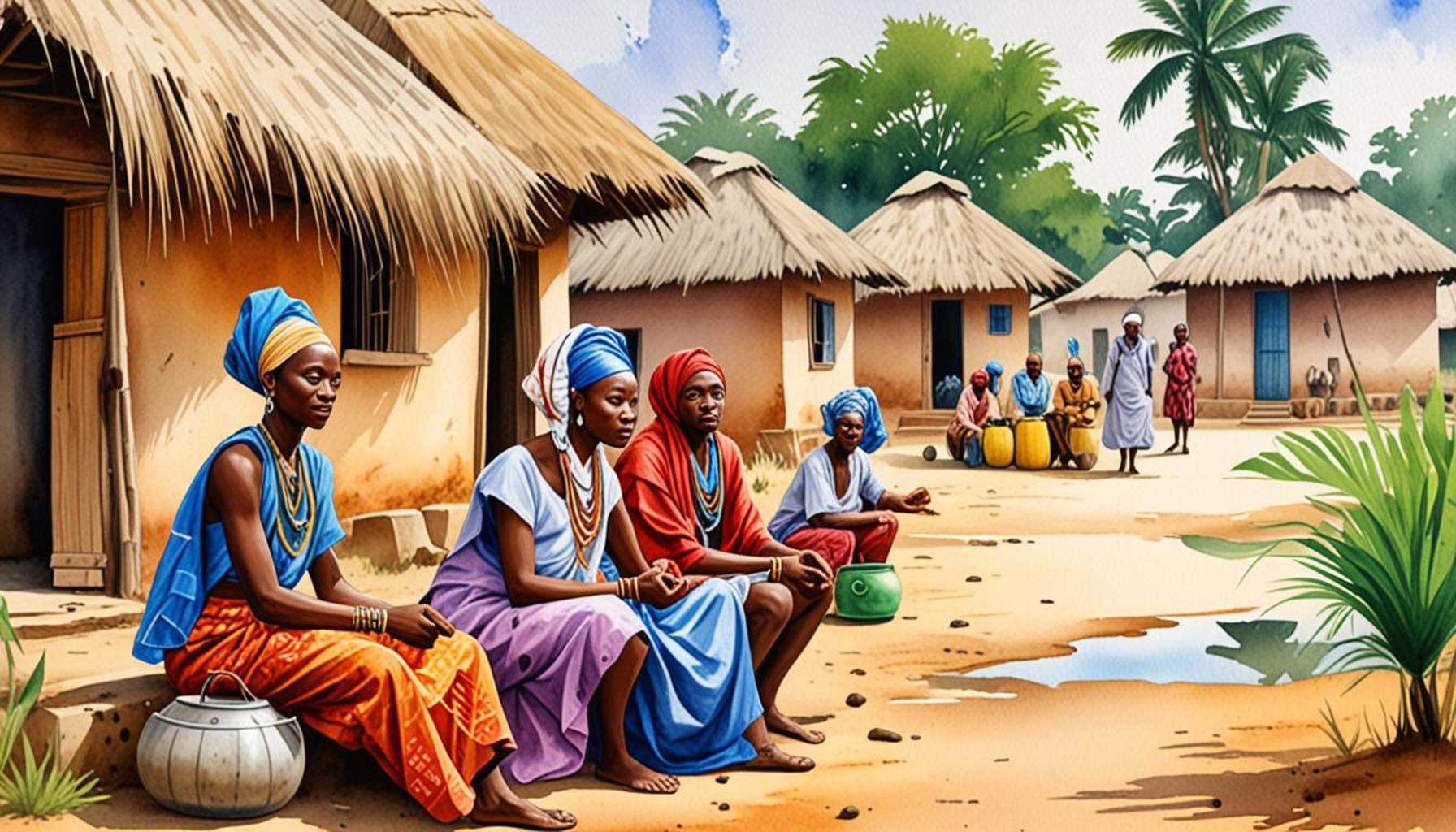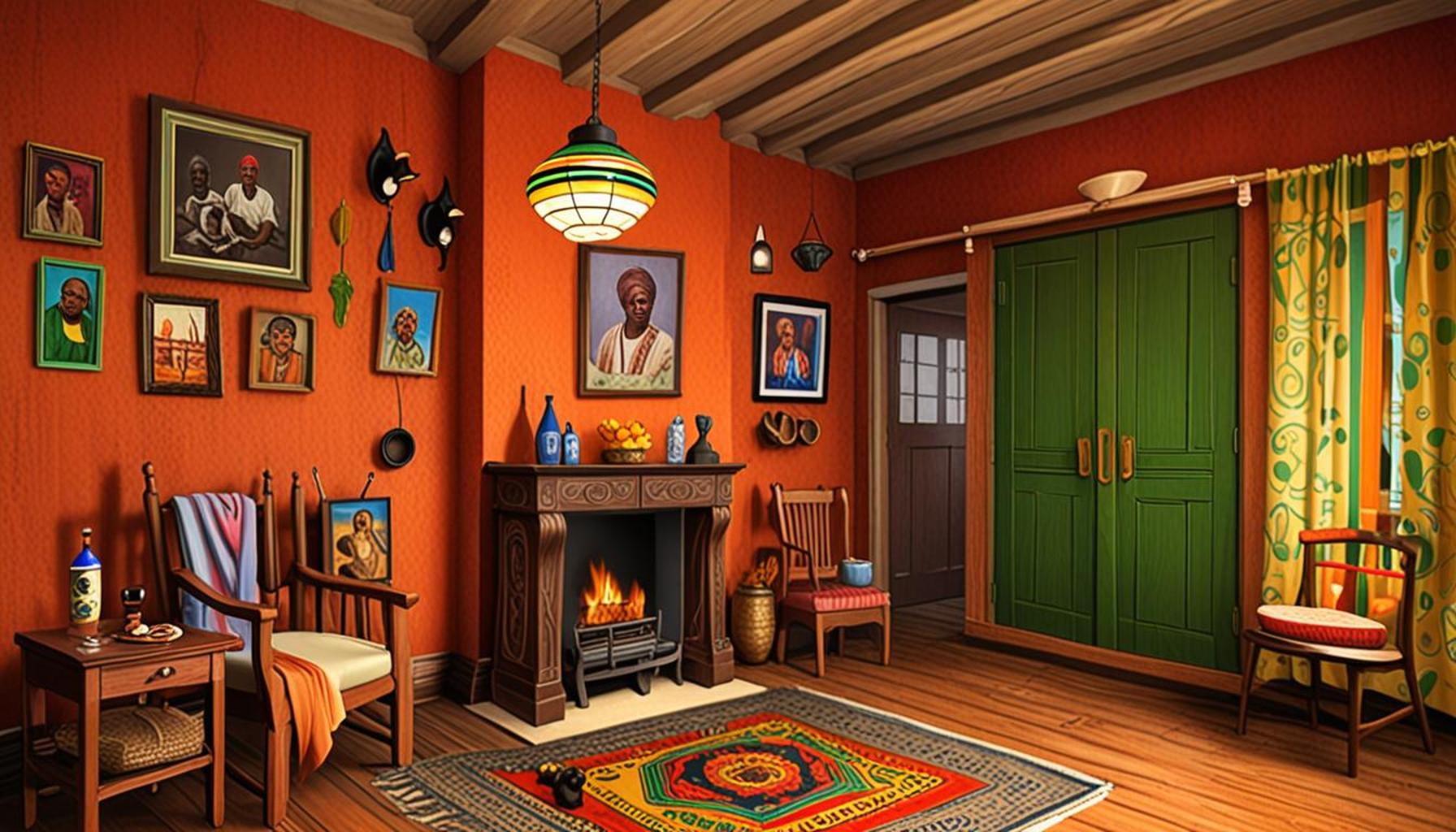Accommodations in Traditional Communities: Cultural Immersion in Travels through Nigeria

Discovering the Heartbeat of Nigeria
Traveling through Nigeria opens the door to a rich tapestry of traditions, lifestyles, and experiences that stand as testimony to the nation’s cultural depth. Cultural immersion in traditional communities offers visitors a unique glimpse into the authentic Nigerian way of life, often away from the bustle of urban settings. This experience provides an invaluable opportunity to step into the shoes of local residents, understanding their beliefs, practices, and the rhythm of their daily lives.
Imagine waking up to the sounds of nature, surrounded by vibrant colors and historic architecture that tells stories of yesteryears. These accommodations are not just places to stay; they serve as living museums, showcasing:
- Traditional architecture: Experience huts made from mud and thatch in rural villages, much like those found in the Yoruba or Igbo communities. These structures not only reflect local building techniques but also harmonize with the environment, fostering a connection with nature.
- Local culinary delights: Taste homemade dishes that have been passed down through generations, such as jollof rice, pounded yam, and egusi soup. Visitors often find themselves sharing meals with their hosts, bonding over recipes that have cultural significance.
- Cultural rituals: Participate in festivals that celebrate music, art, and community values. Events such as the Osun-Osogbo festival in Osun State immerse travelers in the spiritual life of the local populace, featuring mesmerizing dances, vibrant attire, and the significance of ancestral worship.
Each stay tells a story, offering insights into the customs, values, and daily routines of diverse ethnic groups including the Hausa, Fulani, and Ijaw. By choosing to stay in these traditional accommodations, travelers forge meaningful connections with locals, gaining a deeper understanding of Nigeria’s ethno-cultural tapestry. For example, engaging with the Efik people provides insights into their unique culinary heritage, particularly through their popular festivals that revolve around food.
Moreover, these communities provide an opportunity to experience eco-friendly practices and sustainable tourism. Visitors can engage with artisans, learn about traditional crafts like weaving or pottery, and support local economies during their visit. This not only fosters a sense of community but also promotes environmental awareness and responsible tourism.
A Journey of Discovery
As you embark on your journey through Nigeria, consider immersing yourself in these cultural havens. From the serenity of the countryside to the vibrancy of tribal cities, the accommodations in traditional communities will enrich your travels. Whether you are learning traditional storytelling from a local elder or joining in on a spirited masquerade dance, these experiences shape memories that last a lifetime and encourage lasting friendships across cultural boundaries.

Each destination in Nigeria offers a new lesson and a fresh perspective, highlighting the importance of preserving and celebrating the rich cultural heritage that defines this remarkable nation.
YOU MAY ALSO LIKE: Read read another article
Unveiling Authenticity in Hospitality
When it comes to accommodations in traditional communities, Nigeria offers a spectrum of choices that provide more than just a place to rest. Within these communities, travelers discover labyrinths of history, tradition, and artistry that are woven into every interaction and experience. The accommodations often reflect a blend of indigenous craftsmanship and modern comfort, creating spaces that are both welcoming and culturally resonant.
Staying in a traditional community leads to an immersive experience in the socio-cultural tapestry of Nigeria. Visitors are encouraged to engage with their surroundings, which host a myriad of unique practices and rituals relying on the region’s rich heritage. Here are some compelling aspects of these traditional accommodations that exemplify this cultural immersion:
- Community-Based Living: Many accommodations welcome guests into their homes, fostering an environment of familial bonds. This setup allows visitors to converse with their hosts, where stories of tradition and heritage are shared over evening meals. It’s not uncommon to be invited to participate in local family gatherings, giving an insider’s view of daily life.
- Craftsmanship and Artisanship: Spend time with local artisans who can showcase their skills in traditional crafts. Travelers can observe or even get hands-on experience in weaving, bead-making, or blacksmithing, providing an appreciation for time-honored techniques. The beauty of each craft is rooted in cultural significance, and visitors often leave with a piece of art and a story.
- Language and Communication: Learning basic phrases from local dialects adds authenticity to the experience. The warmth of the community comes alive as smiles exchange stories more profound than spoken language alone. Understanding the context behind words—be it greetings or blessings—can lead to deeper connections and mutual respect.
Moreover, the opportunity to witness various cultural practices—including local governance, spiritual ceremonies, and rites of passage—offers insights into how these communities maintain their ideals in the face of modern pressures. For instance, the Yoruba tradition is rich with festivals such as the ‘Oshun-Osogbo’ where ceremonies revolve around honoring the river goddess. Travelers can immerse themselves in the vibrant ambience, learning not just about cultural customs, but also about the significance that these rituals hold in community life.
The hospitality shown by these traditional communities speaks to a universal truth: that welcoming others is at the core of human experience. Whether it’s enjoying a traditional meal of crumbly fufu served with spicy pepper soup or joining local songs around the fire under starlit skies, the accommodations in these communities allow travelers to form connections that extend beyond their time in Nigeria.
Cultural Exchange and Sustainable Practices
Furthermore, the accommodations encourage a form of sustainable tourism, where the focus is on respecting the environment and uplifting local economies. By choosing to stay with families or in community-run establishments, travelers contribute directly to the livelihoods of their hosts. This exchange not only promotes an understanding of cultural values but also strengthens the essence of what it means to travel thoughtfully and ethically.
As you delve into Nigeria’s heart and soul through its traditional communities, you will find that accommodations are not mere shelters, but gateways to a richer understanding of life itself.
| Cultural Experience | Community Engagement |
|---|---|
| Authentic Traditions | Local Interaction |
| Staying in traditional accommodations allows travelers to experience time-honored customs, from food to rituals. | Engagement with locals fosters meaningful connections and understanding of community lifestyles. |
Exploring accommodations in traditional communities offers unique insights into Nigeria’s rich tapestry of cultures. When travelers choose to stay in such settings, they don’t just find accommodation; they embark on a journey through authentic cultural experiences. This immersion goes beyond sightseeing, allowing visitors to take part in local customs, culinary delights, and age-old traditions that are often absent from urban life.Additionally, community engagement through these accommodations enhances the travel experience. Participants often have opportunities to interact directly with local artisans, farmers, and families, creating a platform for shared stories and experiences. This not only deepens the travel experience but also promotes cultural exchange, encouraging travelers to consider their impact on these communities. Staying in traditional settings cultivates a sense of respect and appreciation, essential for sustainable tourism.As you delve deeper into your journey, the variety of traditional accommodations, such as huts, homestays, and eco-lodges, await, each offering a distinct glimpse into the heart of Nigerian culture. The allure of cultural immersion beckons, presenting unforgettable encounters and memories that last a lifetime.
CHECK OUT: Click here to explore more
Exploring Culinary Traditions and Local Flavors
One of the most energizing facets of staying in traditional communities in Nigeria is the opportunity to delve into the gastronomic heritage of diverse cultures. Each region boasts unique culinary practices rooted in indigenous knowledge and locally sourced ingredients, presenting an exquisite buffet of flavors waiting to be discovered. Traditional accommodations often serve home-cooked meals that showcase the richness and variety of Nigerian cuisine.
Visitors can expect to indulge in dishes like jollof rice, a staple at communal gatherings, or suya, a spicy meat skewer that is a favorite snack for many. The preparation of these meals sometimes involves whole community participation, where travelers are encouraged to take part in ingredient selection and cooking. This engagement not only enhances their appreciation of the dishes but also fosters friendships through shared labor and laughter.
The incorporation of spices such as ginger, pepper, and locust bean creates an unforgettable sensory experience. Furthermore, culinary sessions may include storytelling that links food to local history, making every meal an important lesson in tradition and the significance of food in social cohesion.
Beyond meals, traditional accommodations often extend their cultural immersion through cooking classes led by skilled local chefs. These classes—sometimes held outdoors amid the beauty of rural landscapes—offer hands-on learning experiences where travelers can master local recipes. Further engagements with food producers, like farmers and market vendors, reveal the value of sustainability and collective enterprise, all key in upholding culinary traditions.
Art, Music, and Performative Traditions
The journey into Nigeria’s cultural depth through accommodations is incomplete without interaction with its vibrant art and music scenes. Local crafts, from intricate beadwork to beautifully woven textiles, are not just artistic expressions but carriers of ancestral stories and cultural meanings. Many traditional lodgings provide workshops where guests can learn from artisans who contribute to the nation’s rich artistic landscape.
In addition, traditional music plays a vital role in community gatherings and celebrations. Guests staying in these communities often find themselves swept up in local festivities marked by communal drumming and dancing. An evening of folk music, where rhythms pulse through the air and everyone joins in, captures the essence of community spirit in Nigeria. This interaction not only hones cultural appreciation but also strengthens ties between travelers and hosts, as songs tell stories of historical significance and current relevance.
Participating in these creative outlets provides an insight into the identities expressed through art and performance. Many communities celebrate their heritage through theatrical expressions that dramatize local folklore, offering a captivating view into the history that shapes daily life. Engaging in these practices not only imbues visitors with an understanding of the culture but also leaves unforgettable memories that linger long after their journey concludes.
As travelers nestle deeper into the heart of Nigeria, accommodations in traditional communities pave the way for encounters that enrich understanding and foster connections through culinary arts and cultural craftsmanship.
LEARN MORE: This related article may interest you
Conclusion: Embracing the Essence of Nigeria
In summary, accommodations in traditional communities across Nigeria offer travelers an unparalleled chance to immerse themselves in the country’s rich cultural tapestry. Through engaging with local culinary traditions, arts, and performative expressions, visitors not only savor the unique flavors that define each region but also develop a deeper understanding of the values and stories underlying these practices. From participating in communal cooking sessions to learning the rhythmic art of local dance, each moment spent in these communities becomes a vibrant thread in the larger narrative of Nigeria’s heritage.
This cultural immersion fosters an authentic connection between travelers and local residents, often leading to lifelong friendships that transcend geographical borders. Moreover, such experiences contribute to the sustainability of these communities, emphasizing the importance of preserving their heritage for future generations. As you embark on a journey through Nigeria, consider seeking out traditional accommodations to experience the warmth, vibrancy, and richness of the cultures you encounter.
By prioritizing these interactions, travelers not only broaden their perspectives but also become active participants in the ongoing story of Nigeria’s diverse communities. So, whether it’s sharing a meal of pounded yam and egusi soup or crafting a handmade piece of art, the opportunities for learning and connection are endless. Venture beyond the conventional tourist routes and embrace the essence of Nigeria by making meaningful memories in traditional communities.


